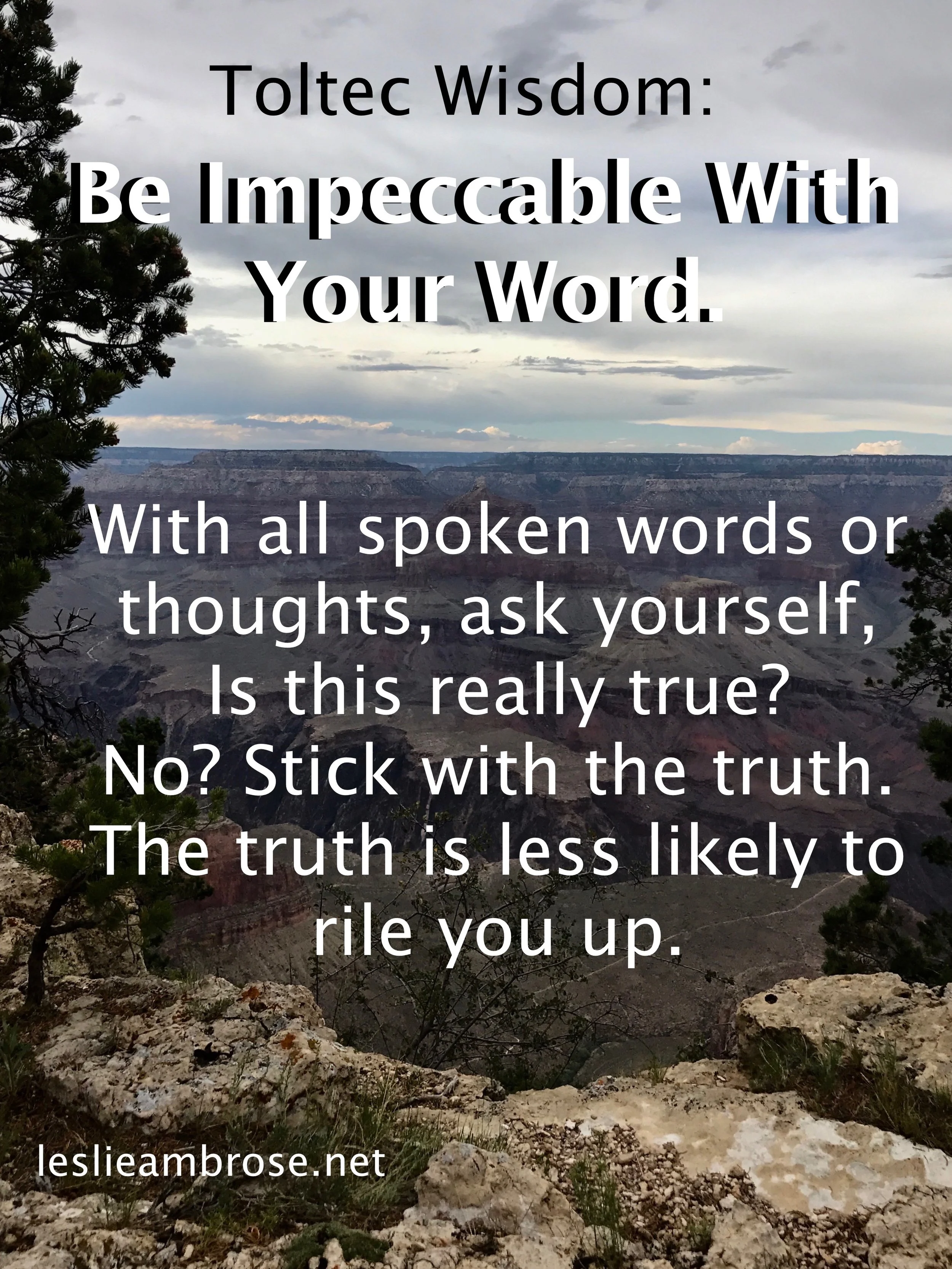The Four Agreements, Toltec Wisdom
The 4 Agreements of Toltec Wisdom have made a peaceful heart (and home) possible for us. I read Don Miguel Ruiz’s short version of the 4 Agreements and immediately taught my children. Together, we were able to shift our perspective and find peace more often than not.
First Agreement: Be Impeccable with Your Word.
With all spoken words and thoughts, ask yourself, Is this really true? Is what I’m thinking or saying a fact, or am I embellishing in some way? Do my words originate from a place of love or fear?
If I’m exaggerating, why am I? If I’m making a point with embellished facts, why am I doing that? If I’m making myself sad with untrue thoughts, why? If I’m stating falsehoods, why am I?
We constantly create with our words. We communicate. We express opinions. When someone hears your words, those words, if accepted, become reality. Words are powerful. They become woven into the fabric of your being. One thread after another can design the outfit you wear. What outfit are you designing for yourself? For your child? Is it protective armor? When you become aware of the power of your words, I believe you have the responsibility to choose them wisely.
What happens when you think and speak from a place of Love?
What happens when you stick to truth?
I found that the truth is less likely to rile you up. That includes truth of your own thoughts. This includes making the conscious decision to only accept the impeccable words of others. We can release our own poisons by choosing what to accept. It is possible for the agitation of the mind to cease.
Second Agreement: Don’t Take Anything Personally.
When others are hurtful, that pain they’re sharing comes from the way they are experiencing the world at this moment. That hurtfulness will actually have nothing to do with you. People will act from their own experiences, expectations and perceptions. You just happen to be the receptor of that. You do not need to accept the hurt, the insult or the offense.
Ok. Guess what? We all act from our own experiences, expectations and perceptions. How do you? Next time you lash out, pay attention. I’d guess someone didn’t meet your expectations. Those expectations are a result of your individual encounter with life. So, in addition to not taking things personally when others speak or act offensively, how can you adjust how you speak and act so as not to offend others? I’m not suggesting that parenting is all peaceful responses, but I am suggesting that a well-thought response can diffuse a toddler or teenager.
“Stop! You’re not safe!” will be received differently than “What the hell are you thinking? I raised you better than that!”
This teaching fosters responding instead of reacting.
Ready for more? Ever have an endless stream of chatter running through your mind? You also have the choice to reject those thoughts and opinions. Just because you can hear the thoughts doesn’t mean they are reality. “I’m so stupid. How could I have done that?” That hang-up is not impeccability of the word. Did you make a mistake? Apparently. Does it mean you’re stupid? No. Don’t take those harmful thoughts personally. Our sense of being is rooted in a place deeper than the mind.
Be strong in your sense of self, then the opinions, whether positive or negative, have no relevance. Teach your child to be strong in his sense of self.
Third Agreement: Don’t Make Assumptions.
When something is unclear to you, ask for clarification.
We are wired to tell stories. Without deliberation, we can create an entire story, complete with details, to explain or justify something, anything: a thought, a response, an action, a reaction. Then, this story feels like truth in our mind. Not only do we believe it, we live it. Pretty soon, it’s part of who we are and part of how we react going forward. And… the person on the other end of the assumption may no longer be on the same playing field with us. Their meaning may or may not match ours. If they throw their idea on the football field, and we’re standing on the baseball diamond, we’re not going to catch it. One tiny miss after another results in a losing team.
Each of us has our own world of thoughts, experiences and perceptions. When we assume others are also living in our world, we end up with misunderstandings, misperceptions and hurt. Keeping this in mind, we can choose clear, impeccable communication.
Since I learned the Agreements, I do try to not make assumptions. I’m way better at asking for clarification. Although I still do make assumptions, the process is accompanied with awareness. Awareness leads to the evaluation process: Do I need to ask for clarification?
How important is it if I’m wrong? Did I base that assumption on truths? Did it come from a story in my mind?
Fourth Agreement: Always Do Your Best.
Always do your best… with the knowledge that your best on a good, healthy day will be different than your best when you’re feeling lousy or sick.
Knowing you’re doing your best offers the comfort that, well, you’re doing your best. This is not striving for perfection. You’ll make mistakes and then learn from them. With the knowledge that you’re doing your best, you can accept yourself. This is who you are… your gifts, your talents, your skills, your values. You may even learn more about who you truly are.
Doing your best also means not over-achieving. Certainly continue to learn and grow and improve, but stay true to who you are, without feeling the need to achieve at a level unattainable with your current skills. This circles back to impeccability. Given your truths, how can you best use your energy?
Living in your own full capacity results from being fully engaged. Being fully engaged keeps you in the present. Peace lives in the Now.
This Agreement leads to the formation of new habits based on all the Agreements, one conscious decision at a time.





